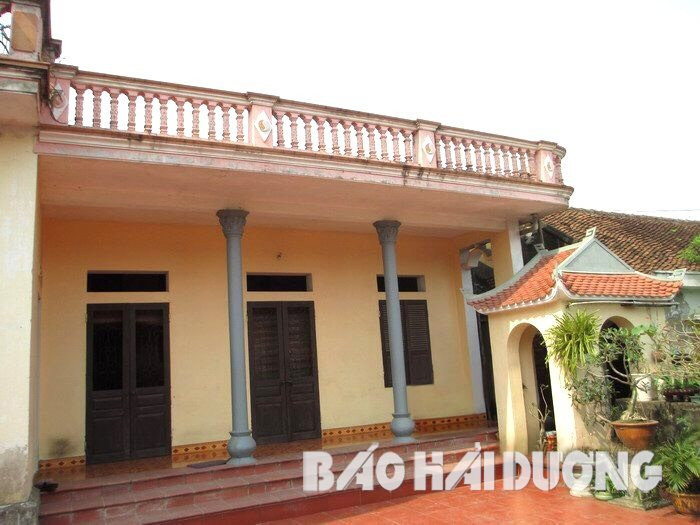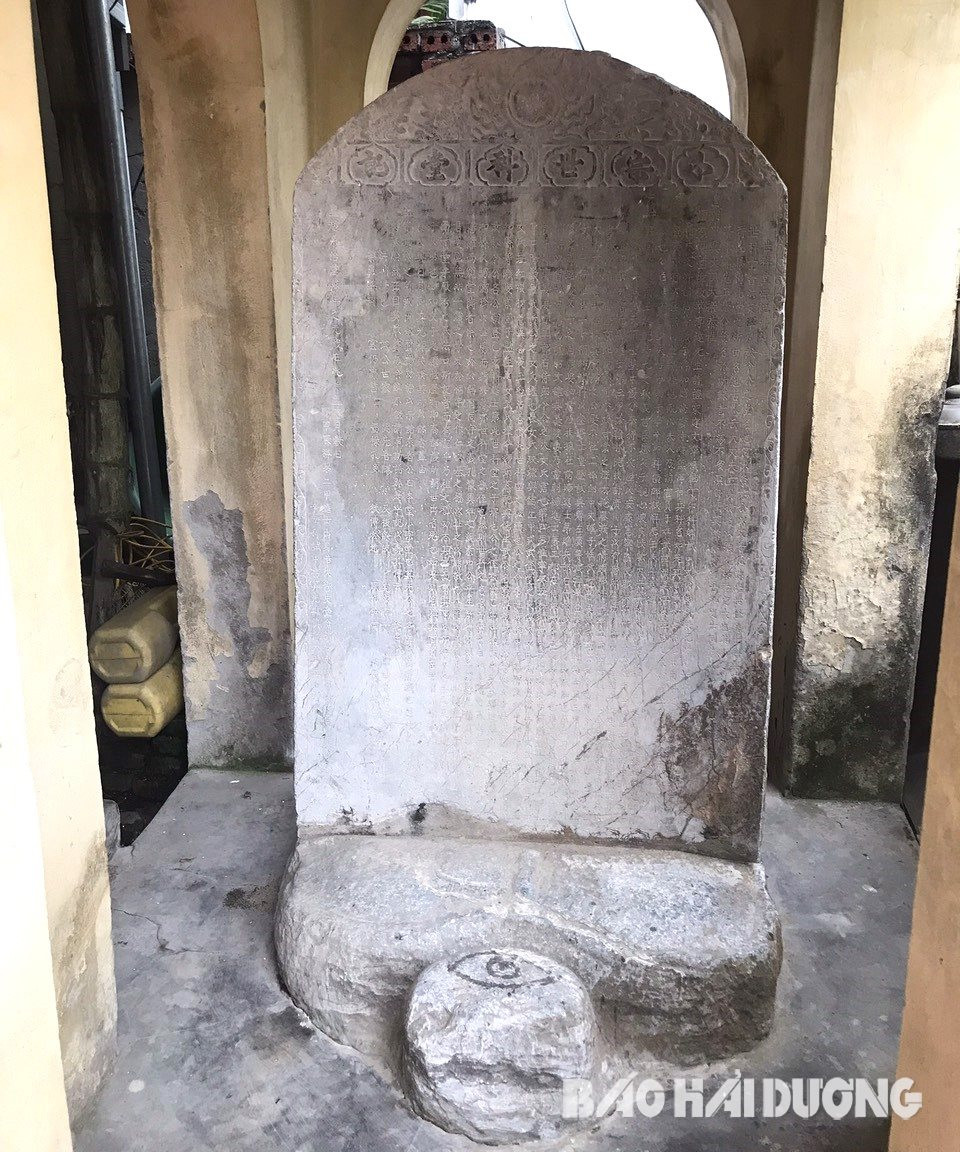Mo Trach village, Tan Hong commune, Binh Giang district (Hai Duong) is famous for its land of mandarinate, known as "Doctoral village" or "Doctoral furnace of the East".

Local people said that Mo Trach village has many clans such as: Vu, Le, Nhu, Nguyen, Ta, Cao, Duong, Truong... Of which, the number of people with the surname Vu accounts for the highest percentage of 87.3%, and this is also a clan famous nationwide for its achievements in the mandarinate.
According to research documents, from 1304 to 1754, in about 450 years, Mo Trach had 36 people who passed the doctoral exam: 4 people with the last name Le, 1 person with the last name Nhu, 1 person with the last name Nguyen, 30 people with the last name Vu. Among them, one person became prime minister, 4 people became ministers, 14 people became ministers, 5 people became district dukes...
According to the historical records of the Mo Trach Vu clan, the ancestor was Vu Hon, from Long Khe district, Phuc Kien province (China), who was an official in the Tang Kinh Tong dynasty, then came to work as the Protectorate Envoy of our country and then settled down in Mo Trach village. Many of his descendants later achieved great success and became a great family in this land. The Vu (Vo) family genealogy book of the 9th-19th century recorded the genealogy of the Vu family in Mo Trach village from the first to the fifth generation, when the "five branches, eight factions" (5 branches, 8 factions) began to form. The genealogy recorded the genealogy of branch 5, from the 5th generation - the founder Vu Phong to the 10th generation, when the later five branches began to form. In particular, the second branch (later five branches) had 3 generations of father, son, grandfather and grandson who all passed the doctoral exam under the Le - Trinh dynasty.
The first person to pass the imperial examination of the second branch (the fifth branch) was Vu Bat Tuy - the second son of Vu Quoc Si (9th generation). He was born in the year of Nham Dan (1602), the 3rd year of Hoang Dinh reign under King Le Kinh Tong. When he was young, his father asked him about his aspirations, he and his younger brother Cau Hoi both wished to follow Confucianism, so his father wished for them to go to school, and when they grew up they became people with profound knowledge. In the year of Dinh Mao (1627), at the age of 26, he passed the Huong Cong examination. At the age of 33, he passed the Dinh Nguyen examination, the second class doctoral examination (Hoang Giap), the Giap Tuat examination, the 6th year of Duc Long reign (1634). He was the one who opened the Mo Trach village during the Le Trung Hung period. He had held the positions of Han Lam, Lai Khoa Do Cap Su Chung, then entered the Lord's palace as Boi Tung, and was later promoted to Thuong Bao Tu Khanh, Huan Trach Ba, with the title Than Dat Vu Dai Cong.
His eldest son, Vu Duy Doan, and his grandson, Vu Duy Khuong, both passed the doctoral exam. Three generations passed the exam, so later the king bestowed the two words "the khoa" (to succeed the previous generations of successful candidates) on the family temple. He was the ancestor of the second branch of the Vu family in Mo Trach village.
Vu Duy Doan was the eldest son of Vu Bat Tuy. According to the Vu (Vo) family genealogy of the 9th-19th centuries, he was born in the year of At Suu (1625), and some books recorded that he was born in 1621. As a child, he was lazy in studying and often did not memorize lessons. When he grew up, he knew how to think, studied hard, and remembered everything he learned. In the Tan Mao (1651) examination, he took the provincial examination for the first time and immediately passed the first prize. His literature began to become famous in the world. In the Giap Thin (1664) examination, he passed the doctoral exam at the age of 40 and became an official with the position of Minister of Public Works.
Vu Duy Doan was trusted by Lord Trinh without flattery or taking advantage of the Lord's kindness for his own benefit. The Lord loved to watch cockfighting and gamble, and liked to listen to flattery. He wrote a golden book in the national language, frankly criticized and advised the Lord, and was praised by the Lord. Once the Lord skipped a court session to watch a cockfight. Someone flattered the Lord and brought a good chicken, and he was there too. He held the chicken to observe, then raised his hand, lifted the chicken up, and threw it to the ground with great force. The chicken struggled and died immediately. Everyone was scared, the Lord left, and the cockfight ended.
The Lord sent him and Doctor Vu Cong Dao to receive the Mac prisoners. The document was delivered in accordance with the wishes of a eunuch, and the names of the two men, who were then high-ranking officials, were written under the eunuch's name. The two men kowtowed to explain, requesting that the document be rewritten to conform to discipline. Trinh Tac angrily said: "In the past, whether it was a dead chicken or mine, I ignored it and didn't say anything, but now I'm still so unreasonable?"
Because he spoke frankly and displeased Lord Trinh, he and Vu Cong Dao were dismissed from their positions. They returned everything, except their doctoral degrees. They told the envoy who came to collect the royal decrees: "I will return the royal decrees that the king gave me, but I will keep my doctoral degree, which is the result of my studies." Although they were dismissed from their positions, everyone in the court respected the integrity of the two men.
After being dismissed from his position, he returned to his hometown to teach and devoted himself to writing literature. He established the Ky Anh restaurant (at the entrance of the village, near the south gate) to discuss literature with the elders and teach. He composed the poem Pham Lai playing in Ngu Ho and works on the landscape of Mo Trach village, agricultural research, Di Van Ki... in Nom script which were widely circulated. Although he gave up state affairs, people in the court and in the countryside respected his reputation. Later, Lord Trinh repented and restored his title. He died in his hometown and was posthumously awarded the title of Ta Thi Lang of the Ministry of Finance, with the title of Count by the court.
The grandson of Vu Bat Tuy was Vu Duy Khuong, the eldest son of Vu Duy Doan, who studied with Vu Cong Dao when he was young. He passed the exam once and immediately became a doctor. In the year Canh Tuat (1670), at the age of 27, he passed the doctorate. His superiors remembered his father's achievements and loved him, and gave him the position of Inspector General, then promoted him to Kinh Bac Governor, and also held the position of Water Army Commander. He entered the Lord's palace as a Boi Tung, and was then sent to the border gate to await orders. Here, he composed many poems in response to the court official, Deputy Inspector General Tran Tho (from Dien Tri commune, Chi Linh district, now Nam Sach district) and the envoy of Bac Canh Hoa and the others. On his return, he fell ill and died. He became an official at the rank of Minister of Rites, was awarded the title of Tham Chinh, the title of Yen Khe Nam, and the title of Du Phuong.
The elders in branch 2, surname Vu, said: The temple was built by the ancestor Vu Bat Tuy himself during the Le Trung Hung period. With the tradition of successive achievements and many contributions to the people and the country, to remember the merits of a family of great scholars, the king later granted the temple the two words "the khoa" (continuing the achievements).

On the right side of the ancestral hall, there is a stele "Tieu Tong The Khoa Duong Ky" (a stele recording the descendants of the family who passed the exams through the generations) erected in the first year of Vinh Tri (1676).
On the back of the stele are engraved two classical poems in Nom script, telling about the succession of three generations of the Vu family:
"You come to dad, I just told dad
Congratulations on passing the exam!
The man before him was more skillful than water.
I will later start a family business...”
The current ancestral temple is located on the land of Mr. Vu Duy Tung's family (currently the head of the branch).
The communal house has undergone many renovations, the most recent being in 1994. The three successors to the throne are worthy shining examples of the tradition of studiousness and examinations.
Continuing the tradition of learning and passing exams of their ancestors, the Vu family of Mo Trach village always cares about and takes care of their children's education. Therefore, the Vu family of Mo Trach village in general and the second branch in particular have many people who have achieved success and made many contributions to their homeland and country in all economic, cultural and social fields.
TAM HA